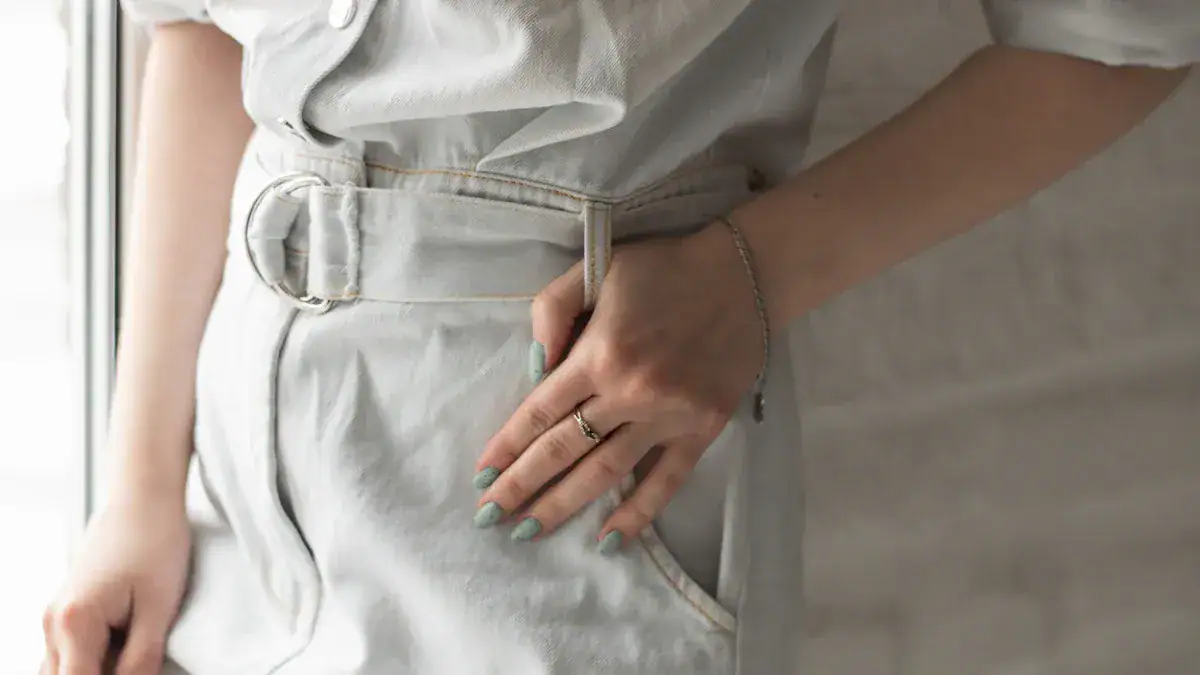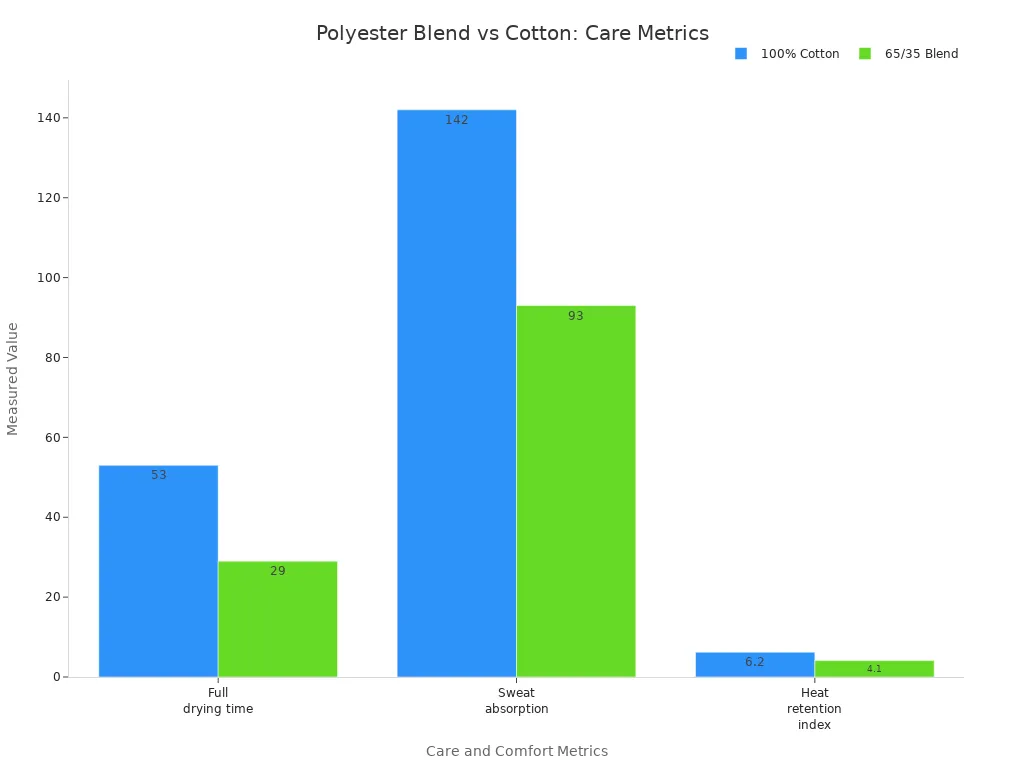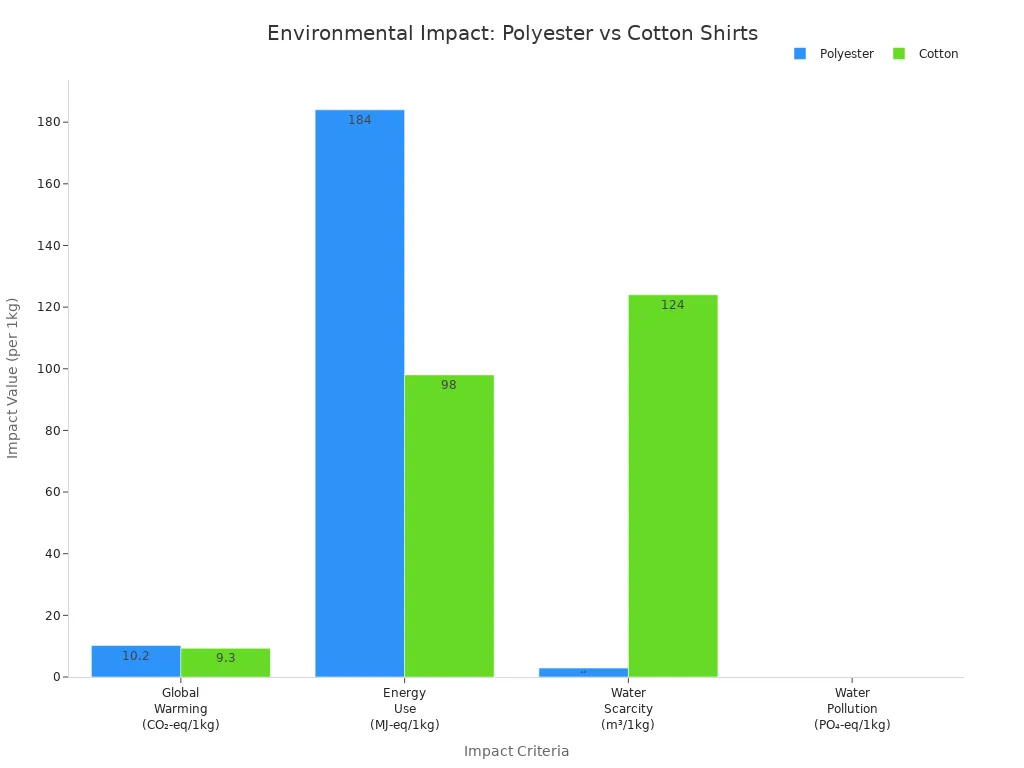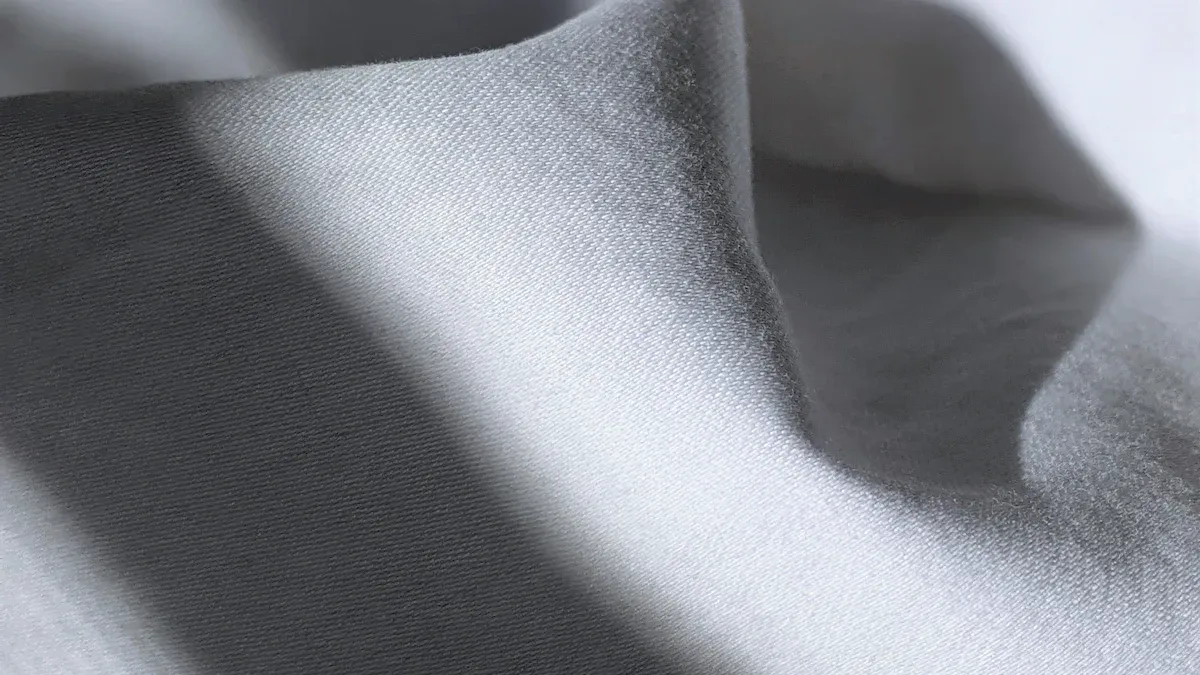Polyester shirts in hot weather pros and cons explained

Polyester shirts often trap heat and limit airflow, making you feel uncomfortable in hot weather. Most studies show that standard polyester does not breathe as well as cotton or linen. However, some new polyester fabrics improve breathability and reduce skin temperature. The table below highlights research comparing different shirt materials:
Study Title | Key Findings |
|---|---|
Does wearing a breathable T-shirt improve the microclimate and thermoregulatory responses during a hot outdoor running? | New polyester fabric improves breathability and lowers skin temperature compared to regular polyester. |
Cotton and linen usually keep you cooler and allow better sweat evaporation.
Key Takeaways
Polyester shirts excel in moisture-wicking, keeping you dry during physical activities.
Quick-drying properties make polyester shirts ideal for humid climates and frequent washing.
Lightweight design enhances comfort and allows for easy movement in hot weather.
Durability of polyester ensures long-lasting wear, resisting fading and shrinking.
Polyester shirts can trap heat and odors, making them less comfortable in extreme heat.
For better breathability, consider cotton or linen shirts, which allow air circulation.
Layering with breathable materials can improve comfort when wearing polyester in hot weather.
Regular washing and proper care help prevent odor buildup in polyester shirts.
Polyester Shirts: Pros in Hot Weather

Moisture-Wicking
Sweat Management
Polyester shirts stand out for their moisture-wicking properties, which help you stay dry even when you sweat. When you wear these shirts in hot weather, the fabric pulls sweat away from your skin and spreads it across the surface. This process allows sweat to evaporate faster, so you feel less sticky and uncomfortable. If you exercise or work outdoors, you will notice that polyester shirts do not cling to your body as much as cotton when wet.
In a study with participants exercising in a hot environment (33 °C, 60% humidity), those wearing polyester shirts had lower body temperatures during the last part of their workout.
The shirts retained less sweat, showing superior moisture-wicking properties compared to other fabrics.
Enhanced ventilation and evaporation in polyester shirts help you maintain a stable body temperature during physical activity.
Active Use Benefits
You will benefit from polyester shirts if you lead an active lifestyle or spend time outdoors. The moisture-wicking properties of these shirts make them a popular choice for athletes, hikers, and travelers. You can move freely without worrying about sweat buildup, which helps prevent chafing and discomfort. Many sports brands use polyester shirts for uniforms and workout gear because they keep you feeling fresh and dry during intense activities.
Quick-Drying
Fast Evaporation
Polyester shirts dry much faster than shirts made from natural fibers like cotton. This feature becomes especially useful if you live in a humid climate or need to wash your shirts frequently.
Studies show that polyester dries much faster than cotton. Research published in the Journal of Applied Polymer Science indicates that polyester absorbs less moisture, which allows it to expel moisture and dry quickly, perfect for those who need to stay dry for long periods.
You can wash a polyester shirt in the morning and wear it again by the afternoon. This quick-drying ability makes polyester shirts ideal for travel, outdoor adventures, or situations where you cannot wait long for laundry to dry.
Lightweight
Comfort for Movement
Polyester shirts offer lightweight comfort, which helps you stay cool and move easily in hot weather. The fabric feels light on your skin and does not weigh you down, even during physical activity.
Polyester is lightweight, contributing to comfort in warm climates.
The moisture-wicking properties help keep your body dry.
When designed with a breathable weave, polyester shirts can enhance cooling and comfort during exercise.
A study comparing polyester and cotton shirts found that polyester shirts led to a greater decrease in forehead temperature during exercise. This result suggests that you may feel more comfortable and less overheated when you choose polyester shirts for active use in hot weather.
Durability
Long-Lasting Wear
You want your shirts to last, especially if you wear them often or wash them frequently. Polyester shirts stand out for their impressive durability. The fibers resist stretching, shrinking, and fading, even after many washes or long hours in the sun. This makes polyester a smart choice if you need shirts that can handle tough conditions.
Take a look at how polyester compares to cotton and linen in terms of durability and care:
Fabric | Durability | Resistance to Shrinking | Resistance to Fading | Care Requirements |
|---|---|---|---|---|
Polyester | High | Yes | Yes | Low |
Cotton | Medium | Yes | No | Medium |
Linen | Medium | No | Yes | High |
Polyester shirts keep their shape and color longer than cotton or linen shirts. You can wear them for outdoor work, sports, or travel without worrying about quick wear and tear. If you spend a lot of time in the sun, polyester resists fading better than most natural fibers. This means your shirts will look newer for longer.
Easy Care
Simple Maintenance
Polyester shirts make your laundry routine easier. You do not need to spend much time ironing or worrying about shrinkage. The fabric dries quickly and resists wrinkles, so you can wash and wear your shirt with minimal effort. If you have a busy schedule or travel often, this feature saves you time and hassle.
The following chart shows how polyester blends compare to cotton in drying time, sweat absorption, and heat retention:

You will notice that polyester-cotton blends dry about 45% faster than pure cotton. They also wrinkle about 60% less, which means you spend less time ironing. Polyester blends shrink less after washing, so your shirts keep their fit and look good longer.
Tip: If you want shirts that are easy to care for and last through many washes, polyester or polyester blends are a reliable option.
Polyester Shirts: Cons in Hot Weather
Poor Breathability
Trapped Heat
You may notice that polyester shirts often feel warmer than shirts made from natural fibers. Polyester does not allow air to flow freely through the fabric. When you wear a polyester shirt in hot weather, your body heat gets trapped. This lack of breathability can make you feel sweaty and uncomfortable, especially if you spend time outdoors or in direct sunlight.
Polyester fibers create a tight weave that blocks airflow. Your skin cannot release heat as easily, so you may experience a buildup of warmth. If you compare polyester to cotton or linen, you will find that natural fibers let air pass through more easily. This difference helps your body cool down faster and prevents overheating.
If you want to stay cool in hot weather, you should choose shirts made from breathable fabrics. Cotton and linen allow heat to escape, while polyester tends to trap it.
Heat Retention
Overheating Risk
Polyester shirts can increase your risk of overheating in hot climates. The fabric holds onto heat and does not absorb moisture like cotton or linen. When you sweat, polyester wicks moisture away but does not cool your skin as effectively as natural fibers.
Polyester exhibits lower sweat retention because it wicks moisture away from your skin. You stay drier, but the fabric does not help release heat.
Cotton absorbs more moisture, which can make you feel damp. However, cotton also releases heat quickly when it gets wet, helping your body cool down.
During exercise, cotton clothing shows sudden increases in surface temperature due to moisture absorption and heat release. Polyester does not show this effect, so it retains heat more consistently.
You may feel hot and sticky if you wear polyester shirts for long periods in the sun. The fabric’s heat retention can lead to discomfort and even heat-related health risks. If you work outdoors or exercise in hot weather, you should consider how your shirt’s material affects your body temperature.
Odor Issues
Sweat Smell
Polyester shirts often develop strong odors after you sweat. The synthetic fibers create an environment where odor-causing bacteria can thrive. You may notice that polyester shirts smell more intense and unpleasant than cotton shirts after physical activity.
Polyester shirts retain and promote the growth of odor-causing bacteria more than cotton shirts. You may experience a musty, ammonia-like, or sour smell.
After exercise, polyester T-shirts have a significantly lower hedonic value compared to cotton T-shirts. This means they smell less pleasant and more sweaty.
The odor from polyester shirts is often described as strong, sweaty, and sour. Micrococci bacteria grow more on polyester fabrics, which increases the smell.
If you want to avoid sweat odors, you should choose shirts made from natural fibers. Cotton and linen do not trap bacteria as easily, so they stay fresher for longer. Polyester shirts may require frequent washing and special care to prevent unpleasant smells.
Tip: If odor is a concern for you, look for shirts with antimicrobial treatments or choose natural fibers for better freshness in hot weather.
Skin Sensitivity
Irritation Potential
You might notice that polyester shirts can irritate your skin, especially in hot weather. Polyester does not breathe as well as natural fibers. When you sweat, the fabric traps heat and moisture against your skin. This environment allows bacteria to grow, which can lead to itching, redness, or even flare-ups of skin conditions like eczema.
Up to 28.5% of clothing industry workers develop contact dermatitis from fabric exposure.
About 80% of contact dermatitis cases come from irritants, including chemicals and dyes in clothing.
Synthetic fabrics like polyester often trap heat and sweat, increasing the risk of skin irritation.
Polyester’s tight weave and chemical treatments can make it uncomfortable for people with sensitive skin.
If you have sensitive skin, you may feel more comfortable in shirts made from cotton or linen. These natural fibers allow your skin to breathe and reduce the chance of irritation. The choice of fabric and the chemicals used in its production play a big role in how your skin reacts, especially during hot and humid days.
Environmental Impact
Sustainability Concerns
Polyester shirts raise several environmental concerns. The production process uses non-renewable resources like oil and releases more greenhouse gases than natural fibers. Polyester does not break down in the environment, so it contributes to microplastic pollution. When you wash polyester shirts, tiny plastic fibers can enter waterways and harm marine life.
Here is a comparison between polyester and cotton shirts based on key environmental criteria:
Criteria | Polyester | Cotton |
|---|---|---|
Origin | Synthetic (oil) | Natural (plant) |
Renewable | NO | YES |
Biodegradable | NO | YES |
Microplastics | YES | NO |
Land Degradation | NO | YES |
Affects Biodiversity | NO | YES |
Global Warming (CO₂-eq/1kg) | 10.2 kg CO₂ | 9.3 kg CO₂ |
Energy Use (MJ-eq/1kg) | 184 MJ | 98 MJ |
Water Scarcity (m³/1kg) | 2.9 m³ | 124 m³ |
Water Pollution (PO₄-eq/1kg) | 0.0031 kg PO₄ | 0.0167 kg PO₄ |

You can see that polyester uses more energy and produces more greenhouse gases than cotton. However, cotton requires much more water and can cause land degradation. Both fabrics have sustainability challenges, but polyester’s lack of biodegradability and microplastic pollution make it a bigger concern for the environment.
Polyester is less breathable than natural fabrics, which can make you uncomfortable in hot weather.
The material traps heat and odors, making it less suitable for warm conditions.
Polyester can trap bacteria against your skin, increasing the risk of irritation.
The tightly woven fabric does not allow for proper ventilation, which can make hot weather feel even hotter.
Polyester production emits more greenhouse gases and creates microplastics, raising sustainability concerns.
Note: When you choose a shirt, consider both your comfort and the impact on the environment. Natural fibers like cotton and linen may offer better breathability and a smaller environmental footprint, especially in hot weather.
Best Fabrics for Hot Weather

When you want to stay cool and comfortable, your shirt’s fabric matters. Some materials help your body breathe and manage sweat better than others. Let’s compare the most popular choices for hot climates.
Cotton vs. Polyester Shirts
Breathability
Cotton stands out for its excellent breathability. Air moves freely through cotton fibers, which helps your skin stay cool. Polyester, on the other hand, has a tighter weave that traps heat and limits airflow. You might feel stuffy or sweaty in polyester, especially on hot days.
Fabric | Breathability | Comfort in Hot Weather | Moisture Management |
|---|---|---|---|
Cotton | Excellent | High | Moderate |
Polyester | Poor | Low | High |
Cotton allows air to circulate, making it one of the best fabrics for hot weather.
Polyester wicks moisture but does not let your skin breathe as well.
Comfort
You will likely find cotton shirts softer and more comfortable against your skin. Cotton absorbs sweat, which helps cool your body as it evaporates. Polyester dries quickly but can feel sticky or clingy when you sweat a lot. In humid conditions, cotton keeps you cooler, while polyester may make you feel warmer.
Cotton is known for its high permeability, which means it feels soft and cool. Polyester wicks moisture but does not breathe well, so it can cause discomfort in hot and humid weather.
Linen vs. Polyester Shirts
Cooling Effect
Linen is famous for its cooling effect. The hollow fibers in linen shirts let air flow easily, which prevents heat from building up. You will notice that linen feels cool to the touch, even on the hottest days. Polyester, in contrast, tends to trap heat and can make you feel warmer.
Moisture Absorption
Linen absorbs up to 20% of its weight in moisture without feeling damp. This feature helps prevent sweat buildup and keeps you comfortable. Polyester wicks sweat away but does not absorb it, so you might still feel sticky. Linen’s ability to manage both air and moisture makes it one of the best fabrics for hot weather.
Fabric | Breathability | Moisture-Wicking | Comfort | Heat Conductivity | Drying Speed | Anti-Microbial Properties |
|---|---|---|---|---|---|---|
Cotton | High | Moderate | Good | Moderate | Moderate | No |
Linen | Very High | High | Excellent | Low | Fast | Yes |
Polyester | Low | Low | Poor | High | Slow | No |
Blends for Hot Weather
Performance Mix
Blended fabrics, such as cotton-polyester mixes, offer a balance of comfort and durability. You get the softness and breathability of cotton with the quick-drying and wrinkle-resistant properties of polyester.
Cotton-polyester blends feel softer and breathe better than pure polyester.
These blends keep their shape after washing and resist wrinkles, making them practical for daily wear.
Blends are easier to care for and last longer, which is helpful if you need shirts for work or travel.
If you want the best fabrics for hot weather, choose cotton or linen for maximum comfort. Blends are a good option if you need durability and easy care, but pure polyester is less suitable for staying cool.
You can stay comfortable and fresh by picking the right fabric. Cotton and linen are the best fabrics for hot weather because they let your skin breathe and manage sweat well. Blends offer a good compromise, but pure polyester often falls short in hot climates.
Polyester Work Shirt: Is It Suitable?
Workplace Comfort
Heat Management
When you work in hot environments, comfort becomes a top priority. You may notice that a polyester work shirt feels light and dries quickly, but it often struggles with heat management. Polyester tends to trap warmth because the fibers do not allow air to flow freely. Many workplace studies have evaluated personal protective clothing in hot conditions. These reviews show that thermal comfort depends on how well your shirt releases heat. Some polyester work shirts now feature cooling finishes, which can help lower skin temperature for agricultural workers. However, standard polyester shirts still retain more heat than natural fibers.
If you spend long hours outdoors or in high temperatures, you might feel overheated in a polyester work shirt. Cooling technology can improve comfort, but breathability remains limited compared to cotton or linen.
Practical Features
Moisture Control
You may appreciate the practical features of a polyester work shirt. The fabric resists wrinkles, holds its shape, and stands up to frequent washing. Moisture-wicking technology pulls sweat away from your skin, helping you stay dry during physical tasks. Polyester dries quickly, which keeps you cooler throughout the day. Some shirts also offer odor resistance and water-repellent properties, making them suitable for heavy rains or high temperatures.
Here is a comparison of practical features between polyester and cotton work shirts:
Feature | Polyester | Cotton |
|---|---|---|
Durability | Very durable, resistant to wear | Less durable, can wear out faster |
Wrinkle Resistance | Stiff, won’t wrinkle easily | Prone to wrinkling |
Shrinkage | Won’t shrink | Can shrink after washing |
Breathability | Lower breathability | More breathable |
Comfort | Comfortable, but less soft | Soft and comfortable |
Odor Resistance | Odor resistant | Can retain odors |
Moisture Management | Moisture-wicking, dries quickly | Absorbs moisture, stays wet |
Allergic Reactions | Potential for skin irritations | Generally hypoallergenic |
Static Shocks | Risk of static shocks | No static issues |
You will find that a polyester work shirt offers durability and easy care, but it may not keep you as cool as cotton in hot weather.
Alternatives for Work
Natural Fiber Options
If you want better comfort in hot conditions, you should consider natural fiber alternatives. Linen and hemp stand out for their breathability and moisture management. Linen absorbs up to 20% of its weight in moisture and regulates temperature well. Hemp provides natural breathability, absorbs up to four times its weight, and offers antimicrobial and UV protection.
Material | Breathability | Moisture Management | Durability | Additional Benefits |
|---|---|---|---|---|
Linen | Excellent | Absorbs 20% of weight in moisture | Strong and durable | Temperature regulating, sustainable, low maintenance |
Hemp | Naturally breathable | Absorbs up to four times its weight | Three to four times more durable than cotton | Antimicrobial, UV protection, eco-friendly |
You may find that switching to linen or hemp work shirts helps you stay cooler and more comfortable during long shifts in the sun. These natural fibers also offer sustainability benefits and reduce the risk of skin irritation.
Tip: If your job requires you to work in hot weather, try a natural fiber shirt for better breathability and comfort. You can still use a polyester work shirt for durability and moisture control, but natural fibers often provide a cooler experience.
Tips for Wearing Polyester Shirts in Hot Weather
Wearing polyester shirts in hot weather can be challenging, but you can make smart choices to stay comfortable. You should focus on selecting breathable materials, using layering strategies, and maintaining your shirts to prevent odor and discomfort.
Choosing Breathable Designs
Polyester shirts often feel warmer than natural fibers, but some designs help you stay cool. Look for shirts made with breathable materials or blends. Manufacturers sometimes use lightweight, loose-weave polyester or mix it with cotton to improve airflow. You can also find shirts with mesh panels or perforations that allow air to circulate. These features help dissipate heat and keep you comfortable.
Ventilation Features
When shopping for polyester shirts, check for these ventilation features:
Mesh panels under the arms or on the back for extra airflow
Perforated sections that release trapped heat
Lightweight construction that feels cool against your skin
Moisture wicking technology that pulls sweat away and dries quickly
UV protection to block harmful rays during outdoor activities
You should choose shirts with these features to maximize comfort in hot weather.
Staying Comfortable
You can stay comfortable in polyester shirts by using smart layering and choosing the right fit. Loose-fitting shirts allow air to move around your body, reducing heat buildup. If you need to wear a polyester shirt for work or sports, try layering a thin, breathable undershirt made from cotton or other breathable materials. This layer absorbs sweat and helps prevent irritation.
Layering Advice
Follow these tips for layering:
Wear a moisture wicking undershirt to keep your skin dry.
Choose loose-fitting polyester shirts to improve airflow.
Avoid tight collars and cuffs that trap heat.
Select shirts with ventilation panels for added comfort.
Layering with breathable materials helps you stay cool and comfortable, even when temperatures rise.
Care and Maintenance
Proper care keeps your polyester shirts fresh and comfortable. Odor can build up quickly in synthetic fabrics, especially in hot weather. You should wash your shirts soon after wearing them to prevent bacteria growth.
Odor Prevention
Use these care tips to reduce odor:
Rinse sweaty shirts in cold water right after use.
Wash polyester shirts within 24-48 hours to prevent odor buildup.
Use warm water (around 90-100°F) for washing to avoid setting odors.
Hang shirts outside in sunlight to kill bacteria and eliminate smells.
Keep synthetic shirts separate from cotton during washing.
Clean your washing machine monthly to prevent musty odors.
Regular care and quick washing help you keep your shirts comfortable and odor-free.
Tip: Choose polyester shirts with moisture wicking and ventilation features, layer with breathable materials, and follow a strict care routine to stay comfortable in hot weather.
Polyester shirts usually do not keep you cool in hot weather. You may find cotton or linen shirts more comfortable because they breathe better and absorb sweat. Polyester works best when you need moisture-wicking, lightweight, or wrinkle-resistant clothing. You might choose polyester shirts for sports or travel if they offer these features:
Breathable fabric for airflow
Lightweight feel for comfort
Stretch for easy movement
Wrinkle resistance for easy care
For most hot days, natural fibers remain your best choice.
FAQ
Can you wear polyester shirts in extreme heat?
You can wear polyester shirts in extreme heat, but you may feel uncomfortable. The fabric traps heat and limits airflow. Choose shirts with mesh panels or blends for better comfort.
Do polyester shirts cause more sweating?
Polyester shirts wick moisture away, but they do not breathe well. You may sweat more because the fabric traps heat against your skin. Cotton and linen help your skin stay cooler.
How do you prevent odor in polyester shirts?
Wash polyester shirts soon after wearing them. Use warm water and hang them outside in sunlight. Look for shirts with antimicrobial treatments to reduce odor buildup.
Are polyester shirts safe for sensitive skin?
Polyester shirts may irritate sensitive skin, especially in hot weather. The fabric traps sweat and bacteria. You should choose cotton or linen shirts for better comfort.
What is the best way to wash polyester shirts?
Wash polyester shirts in cold or warm water. Avoid high heat in the dryer. Use mild detergent and hang shirts to dry. This method helps prevent shrinking and odor.
Is a polyester-cotton blend better for hot weather?
A polyester-cotton blend offers better breathability than pure polyester. You get the durability of polyester and the comfort of cotton. Blends dry quickly and resist wrinkles.

